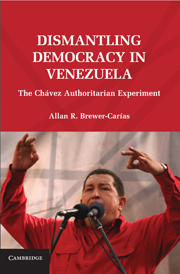Book contents
- Frontmatter
- Contents
- AUTHOR'S NOTE
- INTRODUCTION DEFRAUDING DEMOCRACY THROUGH NONCONSENSUAL CONSTITUENT ASSEMBLIES
- PART ONE THE POLITICAL ASSAULT ON STATE POWERS AND THE FRAMEWORK FOR AUTHORITARIANISM
- PART TWO INSTITUTIONAL DEVELOPMENT TOWARD CONSOLIDATING AUTHORITARIANISM
- Chapter 5 CONSTITUTIONAL FRAUD AND DEFRAUDING DEMOCRACY
- Chapter 6 THE REINFORCED CENTRALIZATION OF THE FEDERATION
- Chapter 7 CONCENTRATION OF POWERS AND AUTHORITARIAN GOVERNMENT
- Chapter 8 THE CATASTROPHIC DEPENDENCE AND POLITICAL SUBJECTION OF THE SUPREME TRIBUNAL OF JUSTICE
- Chapter 9 STATE APPROPRIATION, NATIONALIZATION, EXPROPRIATION, AND CONFISCATION OF PRIVATE ASSETS
- PART THREE CONSTITUTIONAL REFORMS DESIGNED TO CONSOLIDATE AUTHORITARIANISM
- INDEX
Chapter 6 - THE REINFORCED CENTRALIZATION OF THE FEDERATION
Published online by Cambridge University Press: 05 June 2012
- Frontmatter
- Contents
- AUTHOR'S NOTE
- INTRODUCTION DEFRAUDING DEMOCRACY THROUGH NONCONSENSUAL CONSTITUENT ASSEMBLIES
- PART ONE THE POLITICAL ASSAULT ON STATE POWERS AND THE FRAMEWORK FOR AUTHORITARIANISM
- PART TWO INSTITUTIONAL DEVELOPMENT TOWARD CONSOLIDATING AUTHORITARIANISM
- Chapter 5 CONSTITUTIONAL FRAUD AND DEFRAUDING DEMOCRACY
- Chapter 6 THE REINFORCED CENTRALIZATION OF THE FEDERATION
- Chapter 7 CONCENTRATION OF POWERS AND AUTHORITARIAN GOVERNMENT
- Chapter 8 THE CATASTROPHIC DEPENDENCE AND POLITICAL SUBJECTION OF THE SUPREME TRIBUNAL OF JUSTICE
- Chapter 9 STATE APPROPRIATION, NATIONALIZATION, EXPROPRIATION, AND CONFISCATION OF PRIVATE ASSETS
- PART THREE CONSTITUTIONAL REFORMS DESIGNED TO CONSOLIDATE AUTHORITARIANISM
- INDEX
Summary
As it is provided in the 1999 Constitution, federalism in Venezuela is a contradictory form of government. Typically, a federation is a politically decentralized state organization based on the existence and functioning of autonomous states. The power of that decentralized state is distributed among the national state and the member states. In contrast, the federation in Venezuela is a centralized federation, which is a contradiction in itself.
Unfortunately, Venezuela is not a good example of the importance of federalism in Latin America because it is a federation based on a very centralized national government, with twenty-three formal autonomous states and one capital district. Each of these twenty-three formal autonomous states is without its own effective public policies and its own substantive subnational constitutions; and if it is true that they have elected authorities, those have been weakened by the central government. Regarding the capital district, against the provisions of the 1999 Constitution, it has been regulated in 2009 by a national law with the same trends as the former federal district; that is, without self-government, dependent of the national executive.
But the federation in the country's history has not always been like it is now. The centralization of the federation occurred progressively during the twentieth century and has been particularly accentuated during the past decade.
Centralization began with the installment of the authoritarian government of the dictator Juan Vicente Gómez, who ruled for approximately three decades in the first half of the twentieth century. During those years, no democratic institutions were developed.
- Type
- Chapter
- Information
- Dismantling Democracy in VenezuelaThe Chávez Authoritarian Experiment, pp. 198 - 211Publisher: Cambridge University PressPrint publication year: 2010



